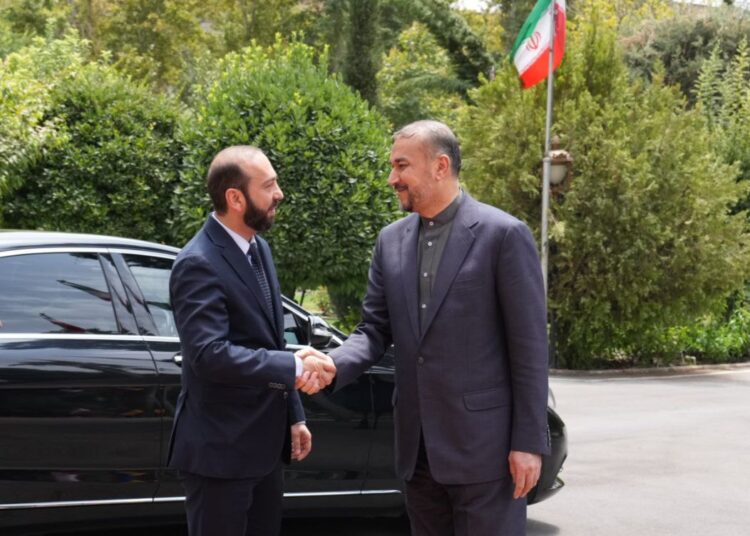On the eve of the trilateral meeting of the foreign ministers of Azerbaijan, Armenia and Russia in Moscow, Ararat Mirzoyan, the Armenian Foreign Minister, arrived in Tehran to hold talks with senior Iranian officials.
Mirzoyan had a meeting with Iranian President Ebrahim Raisi on Monday evening. Raisi expressed Iran’s backing for the peace negotiations between Baku and Yerevan and stated that Iran rejects any geopolitical alterations and border changes in the region.
He affirmed that “Iran supports the sovereignty and territorial integrity of all countries in the region.” These remarks by the Iranian President hold significance ahead of the trilateral and bilateral meetings tomorrow in Moscow.
According to a statement from the Russian Foreign Ministry, the foreign ministers of Armenia, Azerbaijan, and Russia will meet in Moscow on July 25 for separate and trilateral talks amid heightened tensions over the situation on the Lachin Corridor, the only road linking Armenia with Nagorno-Karabakh.
The Armenian Foreign Minister also conferred with his Iranian counterpart, Hossein Amirabdollahian, on Monday afternoon, just before the meeting with the president. After their meeting, Iran’s foreign minister said at a joint press conference that “the Caucasus should not turn into a battleground for rival powers. Such a scenario would hamper peace in the Caucasus and pose a serious challenge for the region.”
Amirabdollahian said, “Iran endorses the 3+3 format (three regional countries and three neighboring countries including Iran, Russia and Turkey) for the negotiations in the Caucasus.”
The Armenian Foreign Minister, while criticizing the policies of the Republic of Azerbaijan, said, “The Republic of Azerbaijan has pursued ethnic cleansing policies instead of engaging in dialogue with the people of Nagorno-Karabakh.”
He added, “Iran has always been and will remain a unique friend for us, especially in overcoming the existing challenges.”
Prior to the ministers’ dialogue, the Iranian Foreign Ministry’s spokesperson, Nasser Kanaani, articulated Iran’s alacrity to fortify the Caucasian peace and stability in his weekly press briefing.
In Kanaani’s address, he expressed, “We extend our welcome to the peace negotiations between Armenia and Azerbaijan aimed at forging a comprehensive, enduring peace. A firm stability within the region would undoubtedly benefit all nations involved, and furthermore, the region itself. Iran stands poised to employ its capacities in realizing an enduring peace and a more stable Caucasian region.”
When questioned about the primary agenda of the Iranian and Armenian foreign ministers’ consultations, Kanaani clarified: “The visit of the Armenian Foreign Minister aligns with the context of bilateral relations. It’s a reciprocal measure, echoing the previous visit of Amirabdollahian to Yerevan.”
Iranian Foreign Minister visited Yerevan in October 2022, where the Consulate General of Iran in Kapan was inaugurated.
Expounding on the dialogue’s broader context, Kanaani further added: “The venue for conversation and deliberation with Armenia spans across various topics such as energy cooperation, economic partnerships, transit, and regional issues within the bilateral cooperation framework. Matters regarding the South Caucasus hold immeasurable significance for Iran. Iran also offers its support for the peaceful resolution of disputes among neighbors.”
This is Minister Ararat Mirzoyan’s second visit to Tehran during the current Iranian government’s tenure. His initial journey to Tehran took place in October 2021.
In light of geopolitical and security considerations, Iran and Armenia have fostered burgeoning political ties. However, the economic relations between the two nations have not developed commensurately with their political rapport. Despite being the sole member of the Eurasian Economic Union to share a land border with Iran, and thus positioned to serve as a conduit between Iran and the union, the volume of economic exchange between Iran and Armenia has not experienced significant growth, even in the wake of a free trade agreement between Iran and the Eurasian Union.
In the past, Iran and Armenia have concurred to double Iran’s natural gas exports to Armenia, and their energy exchange agreement (gas-electricity) has been extended until 2030, with aspirations to elevate the volume of commercial relations between the two countries to 3 billion dollars.
Armenia boasts favorable economic conditions, with government policies aimed at diversifying foreign investment and an evolving financial and banking sector. The Armenian economy remains open to foreign competition. Nevertheless, should tensions persist in the relations between Russia and the West, Armenia may face challenges.






